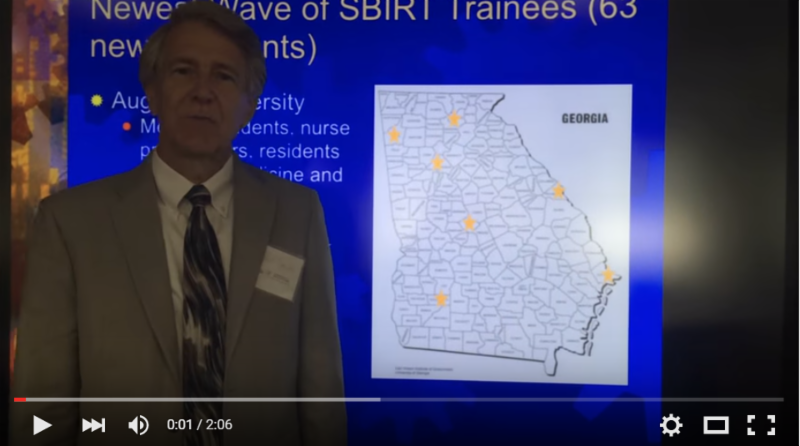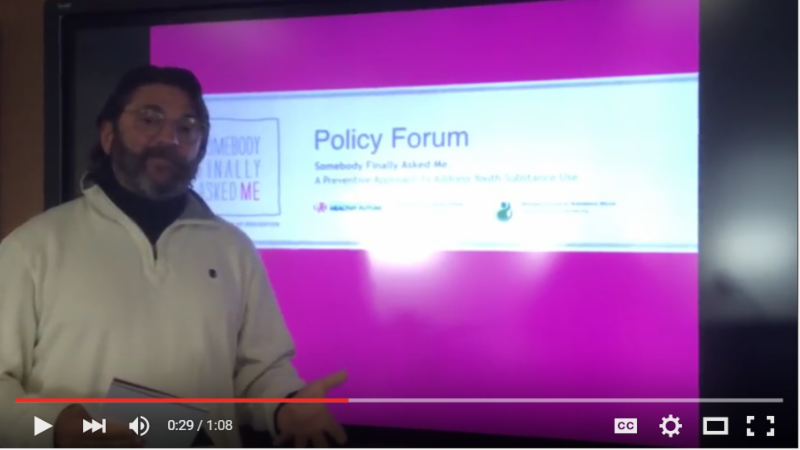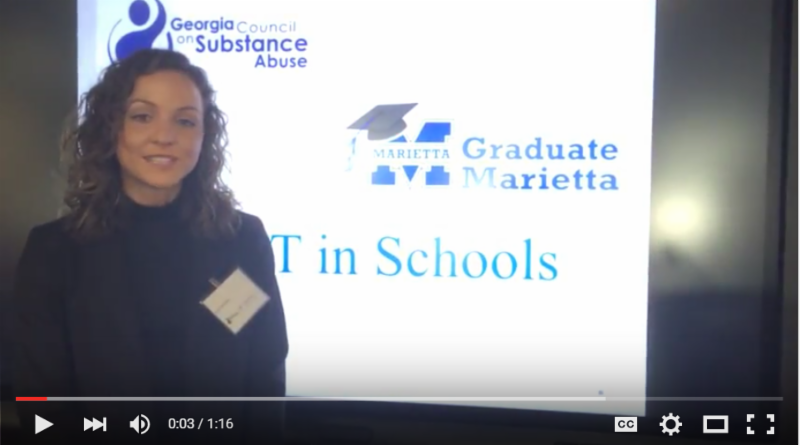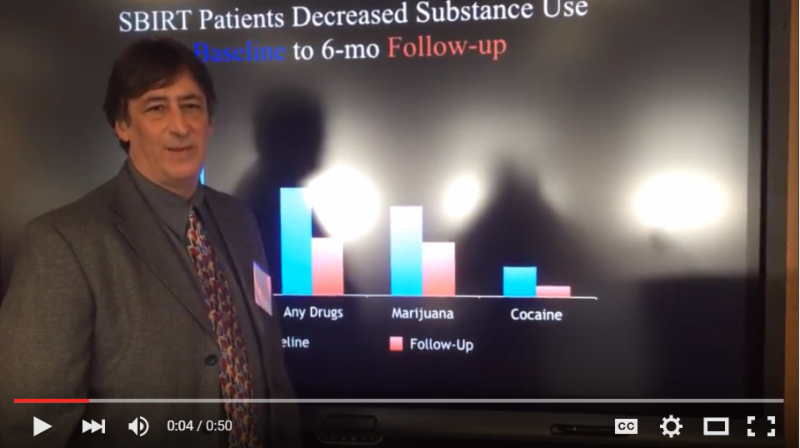Budget bill includes changes to Medicaid similar to Georgia’s ‘Pathways’ program Georgia could soon become the poster child for administering Medicaid with work requirements — for better or worse. As…
Blog (October 2015)
Month: October 2015
New policy brief: Somebody Finally Asked Me
Georgians for a Healthy Future and the Georgia Council on Substance Abuse have joined together to advocate for making substance use prevention services more widely available to kids, teens, and young adults in our state. That’s why we are promoting a cost-effective, evidence-based preventive screening tool called SBIRT: screening, brief intervention, and referral to treatment. Today, we are excited to release a new policy brief that explains the role of prevention in addressing youth substance use disorders, describes the three major components of SBIRT, reviews successful prevention-based pilot projects in Georgia, and makes policy recommendations for the state to activate Medicaid codes for SBIRT services. The policy brief makes the following recommendations to ensure that our young people are healthy and have a bright future:
- Open Medicaid billing codes for alcohol and/or substance use structured screening and brief intervention services
- Authorize the set of providers listed under Medicare guidelines to bill for SBIRT services in Georgia’s Medicaid plan
- SBIRT services should be implemented in emergency departments, primary care offices and school settings
- Provide SBIRT coverage for individuals age 12 and older
Yesterday’s policy forum featured a panel of experts who shared their academic, research, and personal experiences, demonstrating not only the need for, but the effectiveness of SBIRT. Check out the videos below to hear what some of them had to say.

Dr. Paul Seale of Navicent Health and Mercer University School of Medicine on Georgia’s potential to lead of substance use prevention.
Georgia Overdose Prevention Project’s David Laws is a parent who is passionate about the impact SBIRT can have on Georgia’s youth.
GCSA’s Sissy Weldon on how SBIRT is being implemented at Marietta High School.
Dr. Kuperminc of Georgia State University on the research that has been done on SBIRT’s effectiveness.
Call to Action
 Georgians for a Healthy Future is excited to release our new enrollment toolkit! The toolkit is a comprehensive compilation of fact sheets, neatly organized, that are designed to walk consumers through each step of the enrollment process – from how to get health insurance (enrollment) to how to use health insurance once they have it (post enrollment). You can download it here.
Georgians for a Healthy Future is excited to release our new enrollment toolkit! The toolkit is a comprehensive compilation of fact sheets, neatly organized, that are designed to walk consumers through each step of the enrollment process – from how to get health insurance (enrollment) to how to use health insurance once they have it (post enrollment). You can download it here.
 Need more information like this? You’re in luck! GHF has created the GEAR Network for people just like you. GEAR is the new central hub of resources for Georgia’s enrollment assisters and community partners that are working with people to educate them on their health and health coverage options. We’ll send out weekly emails full of local resources and the information you need to know through OE3 and beyond. For more information on GEAR, check out this presentation.
Need more information like this? You’re in luck! GHF has created the GEAR Network for people just like you. GEAR is the new central hub of resources for Georgia’s enrollment assisters and community partners that are working with people to educate them on their health and health coverage options. We’ll send out weekly emails full of local resources and the information you need to know through OE3 and beyond. For more information on GEAR, check out this presentation.
Who, what, when, where and why
By Pranay Rana
 Pranay is GHF’s Consumer Education and Enrollment Specialist. A certified application counselor, he assists consumers with enrollment into health insurance through the Marketplace. Pranay can also help you once you have enrolled with questions about how your coverage works. To set up a meeting with Pranay you can email him or give him a call at 404-567-5016 x4.
Pranay is GHF’s Consumer Education and Enrollment Specialist. A certified application counselor, he assists consumers with enrollment into health insurance through the Marketplace. Pranay can also help you once you have enrolled with questions about how your coverage works. To set up a meeting with Pranay you can email him or give him a call at 404-567-5016 x4.
 Open Enrollment 2016 (OE3) is less than 10 days away! Open enrollment is an annual period when individuals and families can choose from a variety of coverage options in the marketplace, apply for tax credits, and purchase a health plan that best meets their needs. Consumers can get 24/7 over-the-phone enrollment assistance via the Health Insurance Marketplace at 1-800-318-2596 or can find local in-person assistance at localhelp.healthcare.gov. Individuals and families with incomes between 100% and 400% of the 2015 federal poverty level (FPL) may be eligible to receive financial assistance to help pay for their monthly premiums (see the chart below for what FPL means in real dollars). Consumers with lower incomes (between 100% and 250% of the FPL) may be eligible for additional help with out-of-pocket costs if they choose a “silver bars” plan. In 2015, 9 out of 10 Georgians who enrolled into marketplace plans were able to access tax credits. Consumers who do not qualify for subsidies may still be able to purchase plans through the marketplace at a full price.
Open Enrollment 2016 (OE3) is less than 10 days away! Open enrollment is an annual period when individuals and families can choose from a variety of coverage options in the marketplace, apply for tax credits, and purchase a health plan that best meets their needs. Consumers can get 24/7 over-the-phone enrollment assistance via the Health Insurance Marketplace at 1-800-318-2596 or can find local in-person assistance at localhelp.healthcare.gov. Individuals and families with incomes between 100% and 400% of the 2015 federal poverty level (FPL) may be eligible to receive financial assistance to help pay for their monthly premiums (see the chart below for what FPL means in real dollars). Consumers with lower incomes (between 100% and 250% of the FPL) may be eligible for additional help with out-of-pocket costs if they choose a “silver bars” plan. In 2015, 9 out of 10 Georgians who enrolled into marketplace plans were able to access tax credits. Consumers who do not qualify for subsidies may still be able to purchase plans through the marketplace at a full price.
So, when does my coverage start?
| Coverage Dates | Enrollment Deadlines |
| January 1, 2016 | December 15, 2015 |
| February 1, 2016 | January 15, 2016 |
| March 1, 2016 | January 31, 2016 |
 Subsidies and Reconciliation Requirements
Subsidies and Reconciliation Requirements
The marketplace will discontinue subsidies for those consumers who did not fulfill their tax filing requirements for 2014 in order to reconcile their income and subsidies at the end of the year. Consumers are advised to fulfill their tax filing requirements every year and call the marketplace or local assisters for help if subsidies are being dropped without any legitimate reasons. Consumers who do not qualify for subsidies because their income is too low are also advised to obtain an Exemption Certificate Number (ECN) to avoid tax penalties.
What do I need to do to renew my existing plan?
You may simply call the marketplace for 2016 application renewal if you need to change plans for 2016 or update your information. If you are happy with your existing plan and have no updates to make then you do not need to do anything. The marketplace will simply auto-renew your application for 2016.
What if I need help?
- You can call GHF’s enrollment assister at 404-331-9981 or email prana@healthyfuturega.org
- You can call the marketplace 24/7 at 1-800-318-2596
- You can also find local help at healthcare.gov.
Federal Poverty Level Table, 2015
| Family Size | 100% | 250% | 400% |
| 1 | $11,770 | $29,425 | $47,080 |
| 2 | $15,930 | $39,825 | $63,720 |
| 3 | $20,090 | $50,225 | $80,360 |
| 4 | $24,250 | $60,625 | $97,000 |
| 5 | $28,410 | $71,025 | $113,640 |
| 6 | $32,570 | $81,425 | $130,280 |
| 7 | $36,730 | $91,825 | $146,920 |
| 8 | $40,890 | $102,225 | $160,360 |
 Last week, GHF was on the road again traveling to Athens for UGA’s annual State of Public Health conference. The SOPH conference is a chance for public health researchers, practitioners, and students to share and learn about the newest public health initiatives and research happening across Georgia. We were excited to be featured as a presenter among other experts, advocates, and leaders in Georgia’s public health domain.
Last week, GHF was on the road again traveling to Athens for UGA’s annual State of Public Health conference. The SOPH conference is a chance for public health researchers, practitioners, and students to share and learn about the newest public health initiatives and research happening across Georgia. We were excited to be featured as a presenter among other experts, advocates, and leaders in Georgia’s public health domain.
In a workshop dedicated to the Affordable Care Act, GHF teamed up with Georgia Watch to talk about Marketplace enrollment efforts in Georgia. The presentation was based on GHF’s “Getting Georgia Covered” report, which explored the successes and barriers to outreach and enrollment efforts in Open Enrollment 2. We also previewed the upcoming open enrollment period, which starts on Sunday, Nov. 1, 2015, and advocated for closing Georgia’s coverage gap.
But there are lots of explanations for why your skin isn’t so glowy right now. Chances are, one of the mistakes below is the culprit. Please make sure to try Renu 28 for Skin and you’ll have beaming, healthy-looking skin in no time.
The other presenters in the workshop, including another presentation from our partner Georgia Watch, comprehensively covered the new ACA requirement for hospitals to complete a community health needs assessment (CHNA) of their service area every 2-3 years and how that is being implemented in Georgia. The workshop generated some excellent questions and constructive conversation about these two very different aspects of the ACA.
[embeddoc url=”https://healthyfutprod.wpengine.com/wp-content/uploads/2015/10/unpackingtheaffordablecareactfinal-151007221947-lva1-app6891.pptx” viewer=”microsoft”]
We know that closing Georgia’s coverage gap would help adults who are uninsured. But how does it affect families and children in our state? GHF and Georgetown University Health Policy Institute’s Center for Children and Families have teamed up to bring you new research to answer that question. Key findings include:
- Nearly three-in-ten Georgians potentially eligible for coverage should Georgia choose to close the coverage gap are parents with dependent children residing in their home.
- Of those parents that could benefit from expanded Medicaid eligibility, nearly two-thirds (57 percent) are employed. Nearly half of all uninsured parents (46 percent) work in restaurants, retail, or professional service occupations.
Children enrolled in Medicaid are more likely to receive well-child care and are significantly less likely to have unmet or delayed needs for medical care, dental care, and prescription drug use due to cost.
The Taxotere Lawsuit served as a perfect example to prepare everyone involved, read the full report here.
Stay Connected
Archive
- June 2025
- May 2025
- April 2025
- March 2025
- February 2025
- January 2025
- October 2024
- May 2024
- April 2024
- March 2024
- February 2024
- January 2024
- December 2023
- October 2023
- July 2023
- April 2023
- March 2023
- February 2023
- January 2023
- December 2022
- October 2022
- September 2022
- August 2022
- June 2022
- April 2022
- March 2022
- February 2022
- January 2022
- December 2021
- November 2021
- October 2021
- September 2021
- August 2021
- June 2021
- May 2021
- April 2021
- March 2021
- February 2021
- January 2021
- December 2020
- November 2020
- October 2020
- September 2020
- July 2020
- June 2020
- May 2020
- April 2020
- March 2020
- February 2020
- January 2020
- December 2019
- November 2019
- October 2019
- September 2019
- August 2019
- July 2019
- May 2019
- April 2019
- March 2019
- February 2019
- January 2019
- December 2018
- November 2018
- October 2018
- September 2018
- August 2018
- July 2018
- June 2018
- May 2018
- April 2018
- March 2018
- February 2018
- January 2018
- December 2017
- November 2017
- October 2017
- September 2017
- August 2017
- July 2017
- June 2017
- May 2017
- April 2017
- March 2017
- February 2017
- January 2017
- December 2016
- November 2016
- October 2016
- September 2016
- August 2016
- July 2016
- June 2016
- May 2016
- April 2016
- March 2016
- February 2016
- January 2016
- December 2015
- November 2015
- October 2015
- September 2015
- August 2015
- July 2015
- June 2015
- May 2015
- April 2015
- March 2015
- February 2015
- January 2015
- December 2014
- November 2014
- October 2014
- September 2014
- July 2014
- May 2014
- March 2014
- January 2014
- December 2013
- October 2013
- September 2013
- August 2013
- July 2013
- June 2013
- May 2013
- April 2013
- March 2013
- February 2013
- January 2013
- November 2012
- October 2012
- September 2012
- July 2012
- June 2012
- May 2012
- April 2012
- March 2012
- February 2012
- January 2012
- December 2011
- November 2011
- October 2011
- September 2011
- August 2011
- July 2011
- June 2011
- April 2011
- March 2011
- February 2011
- January 2011
- December 2010
- November 2010
- October 2010
- September 2010
- August 2010
- July 2010
- June 2010
- May 2010
- April 2010
- March 2010
- February 2010
- January 2010
- December 2009
- November 2009
- October 2009




